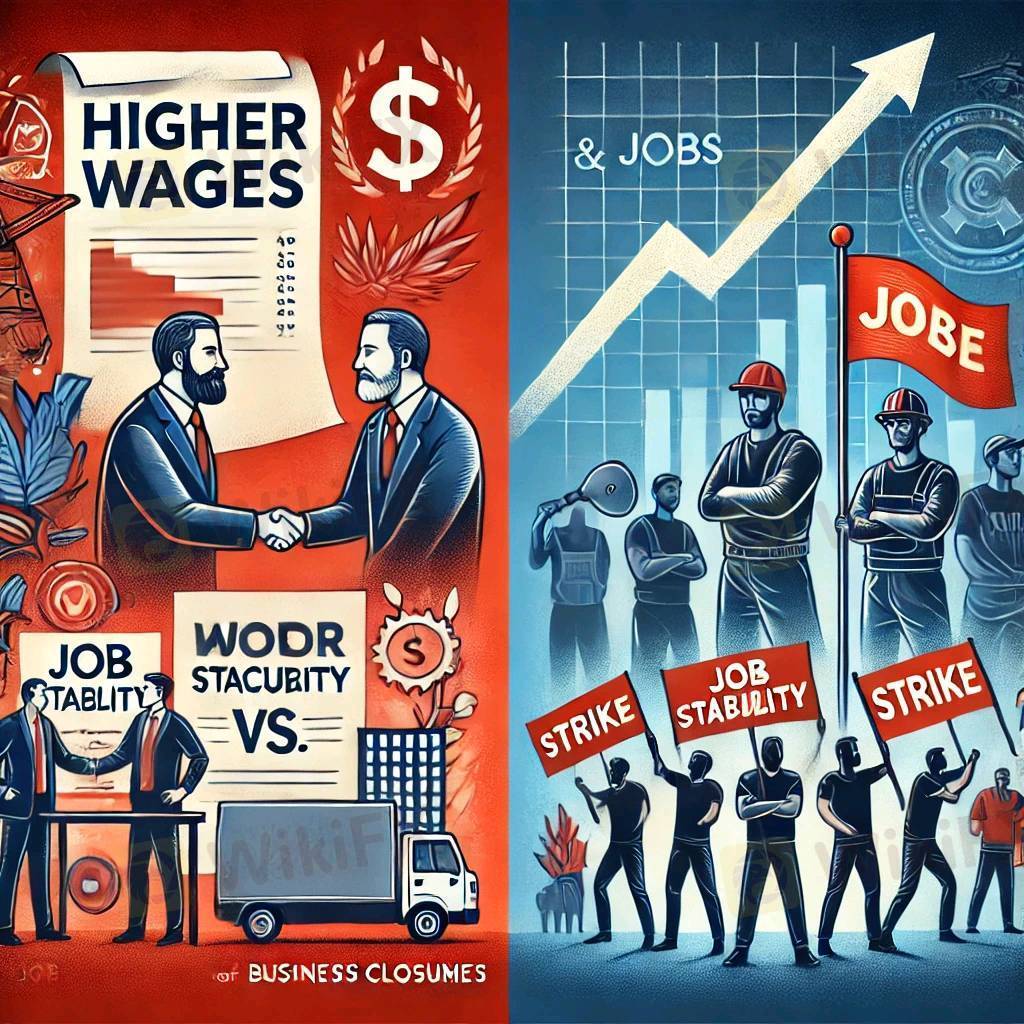
2025-02-17 18:15
IndustryLabor Unions: Impact on Wages and Jobs
#firstdealofthenewyearastylz
Labor unions have played a crucial role in shaping workplace policies, wages, and job conditions worldwide. They act as representatives for workers, negotiating with employers for better pay, benefits, and job security. However, their impact can vary depending on industries, government policies, and economic conditions.
1. What Are Labor Unions?
Labor unions are organizations formed by workers to protect their rights and interests. They engage in collective bargaining, negotiate employment terms, and advocate for labor laws that benefit employees.
Key Functions of Labor Unions:
- Collective Bargaining: Negotiating wages, benefits, and working conditions.
- Job Security Advocacy: Preventing unfair layoffs and promoting stable employment.
- Workplace Safety Improvements: Ensuring safe and healthy working environments.
- Legal Support: Assisting workers with disputes and contract enforcement.
2. Impact of Labor Unions on Wages
Positive Effects:
✅ Higher Wages: Unionized workers typically earn higher wages than non-unionized workers due to collective bargaining power.
✅ Wage Equality: Unions reduce wage gaps by advocating for fair pay across different worker categories.
✅ Better Benefits: Union members often receive superior health insurance, retirement plans, and paid leave.
Negative Effects:
❌ Higher Labor Costs for Employers: This can lead to increased product prices or outsourcing.
❌ Rigid Pay Structures: Unions may limit performance-based pay incentives.
❌ Potential Job Losses: Businesses may hire fewer workers due to higher labor costs.
3. Impact of Labor Unions on Jobs
Positive Effects:
✅ Job Security: Unions help prevent sudden layoffs and unfair dismissals.
✅ Improved Working Conditions: They advocate for workplace safety and fair treatment.
✅ Stronger Employee Protections: They fight against discrimination and exploitation.
Negative Effects:
❌ Reduced Hiring Opportunities: Higher labor costs may discourage employers from expanding their workforce.
❌ Automation & Outsourcing: Some companies relocate jobs to non-unionized areas to cut costs.
❌ Strikes & Work Stoppages: Union disputes can lead to temporary job losses and economic disruptions.
4. The Future of Labor Unions
With changes in technology, remote work, and gig economies, unions are adapting by advocating for:
- Gig Worker Rights: Securing benefits for freelance and contract workers.
- Technology & Automation Protections: Ensuring workers are retrained as industries evolve.
- Global Labor Standards: Addressing fair wages and working conditions worldwide.
Conclusion
Labor unions have a significant impact on wages and job security. While they improve worker conditions and pay, they can also create challenges for businesses. A balanced approach—ensuring fair wages while maintaining job opportunities—is key to a stable labor market.
Like 0

Nita4135
Broker
Hot content
Industry
Event-A comment a day,Keep rewards worthy up to$27
Industry
Nigeria Event Giveaway-Win₦5000 Mobilephone Credit
Industry
Nigeria Event Giveaway-Win ₦2500 MobilePhoneCredit
Industry
South Africa Event-Come&Win 240ZAR Phone Credit
Industry
Nigeria Event-Discuss Forex&Win2500NGN PhoneCredit
Industry
[Nigeria Event]Discuss&win 2500 Naira Phone Credit
Forum category

Platform

Exhibition

Agent

Recruitment

EA

Industry

Market

Index
Labor Unions: Impact on Wages and Jobs
 Nigeria | 2025-02-17 18:15
Nigeria | 2025-02-17 18:15#firstdealofthenewyearastylz
Labor unions have played a crucial role in shaping workplace policies, wages, and job conditions worldwide. They act as representatives for workers, negotiating with employers for better pay, benefits, and job security. However, their impact can vary depending on industries, government policies, and economic conditions.
1. What Are Labor Unions?
Labor unions are organizations formed by workers to protect their rights and interests. They engage in collective bargaining, negotiate employment terms, and advocate for labor laws that benefit employees.
Key Functions of Labor Unions:
- Collective Bargaining: Negotiating wages, benefits, and working conditions.
- Job Security Advocacy: Preventing unfair layoffs and promoting stable employment.
- Workplace Safety Improvements: Ensuring safe and healthy working environments.
- Legal Support: Assisting workers with disputes and contract enforcement.
2. Impact of Labor Unions on Wages
Positive Effects:
✅ Higher Wages: Unionized workers typically earn higher wages than non-unionized workers due to collective bargaining power.
✅ Wage Equality: Unions reduce wage gaps by advocating for fair pay across different worker categories.
✅ Better Benefits: Union members often receive superior health insurance, retirement plans, and paid leave.
Negative Effects:
❌ Higher Labor Costs for Employers: This can lead to increased product prices or outsourcing.
❌ Rigid Pay Structures: Unions may limit performance-based pay incentives.
❌ Potential Job Losses: Businesses may hire fewer workers due to higher labor costs.
3. Impact of Labor Unions on Jobs
Positive Effects:
✅ Job Security: Unions help prevent sudden layoffs and unfair dismissals.
✅ Improved Working Conditions: They advocate for workplace safety and fair treatment.
✅ Stronger Employee Protections: They fight against discrimination and exploitation.
Negative Effects:
❌ Reduced Hiring Opportunities: Higher labor costs may discourage employers from expanding their workforce.
❌ Automation & Outsourcing: Some companies relocate jobs to non-unionized areas to cut costs.
❌ Strikes & Work Stoppages: Union disputes can lead to temporary job losses and economic disruptions.
4. The Future of Labor Unions
With changes in technology, remote work, and gig economies, unions are adapting by advocating for:
- Gig Worker Rights: Securing benefits for freelance and contract workers.
- Technology & Automation Protections: Ensuring workers are retrained as industries evolve.
- Global Labor Standards: Addressing fair wages and working conditions worldwide.
Conclusion
Labor unions have a significant impact on wages and job security. While they improve worker conditions and pay, they can also create challenges for businesses. A balanced approach—ensuring fair wages while maintaining job opportunities—is key to a stable labor market.
Like 0
I want to comment, too
Submit
0Comments

There is no comment yet. Make the first one.

Submit
There is no comment yet. Make the first one.